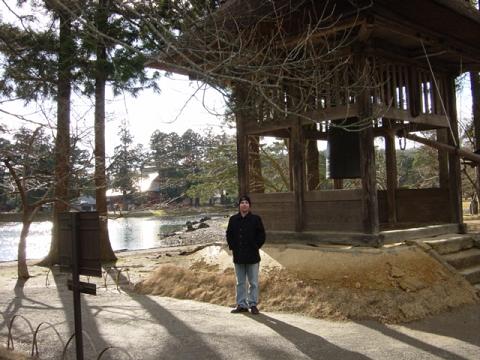Well, if you've made it past part 1, then I guess my controversial blog title hasn't bothered you. I meant it solely to get attention, anyway.
So, if Japanese culture's idea is like the kanji described in part 1, where "humility" could be read as "a state of mind of truth," then how has that shown up in their dealings with other cultures and people from other cultures?
In a previous post, I talked about how Japanese language is heteronomic - the center of the language (and thought and so on) is based outside the self - on the group, on the person you're speaking with, etc.
So the self is considered sort of secondary. I'd like to look into this secondary-ness of Japanese.
Zizek writes:
"Every nation in Europe has this fanaticism, conceiving itself as the true, primordial nation. The Serbian myth for example is that they are the first nation of the world. The Croatians consider themselves as primordial Aryans. The Slovenes are not really slaves, but pretend to be of Etrurian origin. It would be nice to find a nation, which would accept the fact that they are not the first but the second. This might be a part of the Japanese identity, if you look at the way they borrow languages.
"I recently read a book on Kurosawa. It is said that 'Rashomon' was seen in the early fifties as the big discovery of the eastern spirit. But in Japan it was conceived as way too Western. My favorite Japanese film is 'Sansho' by Mizoguchi because it offers itself for a nice, Lacanian reading, the problem of the lost mother, the mother's voice reaching the son, etc. This is the Japanese advantage over America when the mother's voice tries to reach the son. In America one would get madness, like Hitchcock's 'Psycho', but in Japan you get a normal family."
Of course, it is the first paragraph where we find a reference to Japanese secondary-ness. It is interesting that Zizek brings up the borrowing of languages. To many cultures, a language is its own, and the bringing in of words from other languages is anything from frowned upon (American English) to outright not permitted (Was it Iceland that had a huge team work to create native Icelandic words for all of the foreign words that weren't in Icelandic?). In Japan, English is a huge part of the language, and it is as if this does point more towards their feeling of "humility" as secondary-ness, of letting another group be first.
When the Japanese first were opened up to Western culture, they were in awe, and it is easy to see from reading what they said and wrote, that they did in fact feel this secondary-ness.
Fukuzawa, a Japanese scholar who was one of the first to see the West, I believe he took a boat to go live in America awhile, wrote as follows:
"If we compare the knowledge of the Japanese and Westerners, in letters, in techniques, in commerce, or in industry, from the largest to the smallest matter. . . there is not one thing in which we excel. . . . Outside of the most stupid person in the world, no one would say that our learning and business is on a par with those of the Western countries. Who would compare our carts with their locomotives, or our swords with their pistols? We speak of the yin and yang and the five elements; they have discovered 60 elements. . . . We think we dwell on an immovable plain; they know that the earth is round and moves. We think that our country is the most sacred, divine land; they travel about the world opening lands and establishing countries. ... In Japan's present condition there is nothing in which we may take pride vis-a-vis the West. All that Japan has to be proud of ... is its scenery."
This feeling was also abound after wwii, where children in Japan were introduced to things like chewing gum and chocolate from the Western soldiers. It seems the idea of a good person being "sunao, tsutsumashii and otonashii" may have allowed them to be secondary in this way.
Their openness to importing foreign languages is also a part of this. They primarily take in English words, sometimes transforming them in Japanese ways so as they would be unuseable and not understandable in English speaking countries. However, they also take in from other languages - for example, ordering Italian food here involves using the actual Italian words for the foods rather than those Italian names exported to the US, and so on, and many words come from German (such as the word for a part time job - 'baito' which is taken from the German word for work (arbeit).
Sure, all languages have loanwords from other languages. But the degree to which the Japanese do it is on another plane.
I did a random search for a website with Japanese language. Upon finding the first one, I looked for the first paragraph I could find. Within this paragraph of three sentences, there are 12 english words - America, boom, booth, photo, blog, service, programming, site, category, style, web, news. This is pretty typical.
I've rewritten the above paragraph (which also has 3 sentences), replacing similarly functioning words with Japanese equivalents (only 6, half of the 12 found above):
"I did a random kensaku for a website with Nihongo language. Upon finding the first one, I sagashita the first paragraph I could find. Within this paragraph of three bunshou, there are 12 eigo words - America, boom, booth, photo, blog, service, programming, site, category, style, web, news. This is pretty futsuu."
Subscribe to:
Post Comments (Atom)

No comments:
Post a Comment